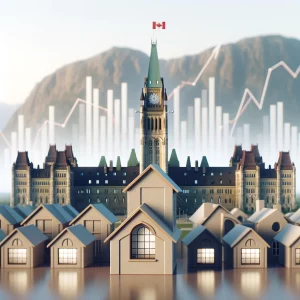
Canada is undergoing rapid political and economic changes. With Mark Carney now serving as Prime Minister, replacing Justin Trudeau, and a snap federal election scheduled for April 28, the national landscape is shifting in ways that directly affect housing and mortgage markets.
These events, combined with ongoing U.S. tariffs on Canadian steel, aluminum, and oil, have introduced short-term uncertainty for buyers, homeowners, and investors. Here’s how to make smart housing and mortgage decisions amid this volatility.
1. Mortgage Planning: Flexibility Is Key
📉 The Bank of Canada is easing rates, but not aggressively—mainly due to inflationary pressure caused by tariffs and broader global uncertainty.
🔹 Carney’s background as a central banker suggests a measured approach to fiscal and monetary stability, not sudden overcorrections.
🔹 Lenders are pricing cautiously, and spreads between fixed and variable remain narrow.
📌 What You Can Do:
-
Consider 1- to 3-year fixed terms if you’re buying or renewing—this offers immediate savings with flexibility for future rate drops.
-
Variable-rate borrowers should prepare for gradual relief, not overnight changes. Budget accordingly.
2. Buying or Selling in a Pre-Election Market
🏠 Confidence is mixed. Some buyers are pausing, waiting to see if the election brings housing reform. Others are jumping in, trying to secure a deal before the market shifts again.
🔹 Tariffs are raising construction costs, especially for materials like steel.
🔹 The removal of the carbon tax (effective April 1) may reduce utility costs and improve monthly affordability slightly for homeowners.
🔹 Carney’s economic leadership may restore investor confidence, encouraging developers to move forward.
📌 What You Can Do:
-
If you’re buying, act before post-election volatility changes affordability.
-
If you’re selling, leverage the low-rate window and improving consumer sentiment.
3. Managing Housing Costs Amid Trade and Tax Changes
💸 Tariffs are still in effect:
-
25% on Canadian steel and aluminum
-
10% on oil (effective April 2)
🔹 This will keep construction costs high, slowing new housing supply.
🔹 Renters may face pressure as ownership becomes more expensive in the short term.
📌 What You Can Do:
-
Delay major renovations if tied to steel, lumber, or fuel-intensive materials.
-
Consider energy-efficient upgrades to offset long-term utility and heating costs.
-
If you own rental property, monitor for tenant hardship as inflation affects living costs.
4. Expect More Policy Announcements Post-Election
📅 With a federal election scheduled for April 28, expect new housing proposals from all parties.
🔹 Mark Carney’s early moves signal a focus on affordability and stability, but long-term direction will depend on electoral results.
📌 What You Can Do:
-
Stay informed on party platforms—especially on housing supply, rent control, and lending rules.
-
If you’re planning to refinance or buy post-election, consider how a policy shift could affect qualifications or rates.
Conclusion
📉 The environment is volatile, but manageable with the right approach.
🏡 Flexibility, caution, and a clear understanding of the economic forces at play will help you make smart mortgage and housing decisions.
🗳️ With a new Prime Minister and an election underway, housing policy may shift significantly in the months ahead.
📌 Next week: We explore the long-term housing outlook once the new government is elected.


